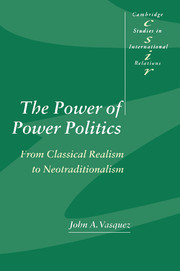Book contents
- Frontmatter
- Contents
- List of figures
- List of tables
- Preface
- Introduction
- Part I The Original Text: Classical Realism and Quantitative International Politics
- Part II Neorealism and Neotraditionalism: International Relations Theory at the Millennium
- 9 Retrospective: neorealism and the power of power politics
- 10 The promise and potential pitfalls of post-modernism: the need for theory appraisal
- 11 The realist paradigm as a degenerating research program: neotraditionalism and Waltz's balancing proposition
- 12 Mearsheimer's multipolar myths and the false promise of realist policy prescriptions: the empirical inaccuracy of the realist paradigm
- 13 Challenging the relevance and explanatory power of the realist paradigm: the debate on the end of the Cold War
- 14 Conclusion: the continuing inadequacy of the realist paradigm
- References
- Name index
- Subject index
- CAMBRIDGE STUDIES IN INTERNATIONAL RELATIONS
10 - The promise and potential pitfalls of post-modernism: the need for theory appraisal
Published online by Cambridge University Press: 22 September 2009
- Frontmatter
- Contents
- List of figures
- List of tables
- Preface
- Introduction
- Part I The Original Text: Classical Realism and Quantitative International Politics
- Part II Neorealism and Neotraditionalism: International Relations Theory at the Millennium
- 9 Retrospective: neorealism and the power of power politics
- 10 The promise and potential pitfalls of post-modernism: the need for theory appraisal
- 11 The realist paradigm as a degenerating research program: neotraditionalism and Waltz's balancing proposition
- 12 Mearsheimer's multipolar myths and the false promise of realist policy prescriptions: the empirical inaccuracy of the realist paradigm
- 13 Challenging the relevance and explanatory power of the realist paradigm: the debate on the end of the Cold War
- 14 Conclusion: the continuing inadequacy of the realist paradigm
- References
- Name index
- Subject index
- CAMBRIDGE STUDIES IN INTERNATIONAL RELATIONS
Summary
Kuhn's analysis of the history of science helped sustain within philosophy of science a series of attacks on positivism and its view of science. This eventually emerged in a full-fledged “post-positivism” that sought to undercut the logical foundation of the attempt to apply the scientific method to the study of human behavior. This movement made a number of criticisms of social science including: the impossibility of a value-free, neutral, and objective science (Taylor 1985: ch. 2), the lack of an Archimedean point to build knowledge (Lapid 1989), and the absence of an independent database to test theories (Hawkesworth 1992). Post-positivism was superseded by an even more epistemologically radical post-modernism that sought to undercut not simply positivism and science, but all aspects of modern thinking, aspiration, practices, and institutions.
Both movements would raise philosophical questions about the paradigm evaluation conducted in the original text. Post-positivists would raise fundamental questions about the logical status of any attempt to appraise theories, let alone paradigms (see Lapid 1989). Post-modernists would see such appraisals as basically power plays, intended to silence and kill off dissident thinking. Yet, if criticism of the realist paradigm is to be taken seriously, it is necessary to have some sort of theory and paradigm appraisal. Post-modernism's claims can be so broad, however – involving a rejection of the entire Enlightenment – that a defense of theory appraisal entails a reconstruction of the very foundation of scientific inquiry.
- Type
- Chapter
- Information
- The Power of Power PoliticsFrom Classical Realism to Neotraditionalism, pp. 214 - 239Publisher: Cambridge University PressPrint publication year: 1999



